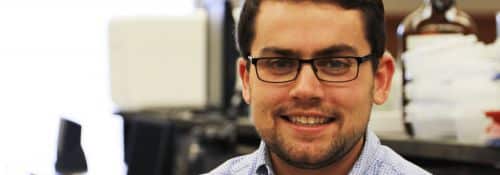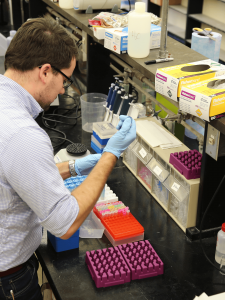
Discovering Beer as a Science
Written by Megan Polston
As an English major whose last science class was sometime during freshman year, I was a little intimidated to sit down with senior Biochemistry major Matt Drogowski. However, I was relieved to find him both knowledgeable and eager to explain his major and his research in terms even a book worm like myself could understand.
Matt’s passion for science needs no embellishment. When speaking with him, his interest in his research spills into nearly every aspect of conversation. For as long as he can remember, Matt has always been attracted to the sciences. He tells me, “learning something new, coming to understand it completely, and observing it in the natural world is a process that brings a curiosity that can’t be replicated.” While most students find organic chemistry to be dull, too complex, or impractical, Matt thrives in his lab coat. He recalls that most students either rise to the challenge of the daunting class or buckle under the weight of coursework.
Growing up in Cheboygan, Michigan, Matt remembers the many occupations his childhood-self aspired to be: Superman, firefighter, and doctor. Over the years, only the third option has carried over to his collegiate life. His father, a doctor himself, has always encouraged independence in his son, inquiring time and again after his motivations in an effort to be sure that this was a decision that Matt was making for himself. However, while Matt’s father is not the primary reason for Matt choosing a medical career, he was certainly among the most influential. Watching his father practice medicine gave Matt a unique perspective into a doctor’s life, including the many challenges and rewards that accompany it.
As a Biochemistry major at Hillsdale College, Matt was able to appease all his interest in chemistry while also fulfilling all of the prerequisites for medical school. When the time came to choose his senior research project, Matt recalled a topic that he had been eyeing since his sophomore year. It was a project that had been started by two or three students who never got the chance to finish it, and it involved brewing beer that is drinkable for individuals with a gluten intolerance.
Prior to this research project, Matt knew almost nothing about the brewing process. But the mere idea of such an interesting opportunity was enough to draw Matt to the office of chemistry professor Dr. Christopher S. Hamilton with a plea to continue the research. After approval, Matt dove into research about the theory of brewing beer, which included taking an Honor’s Seminar specifically focused around beer, science, and styles of sampling. In addition, Dr. Hamilton — an active at-home brewer himself — allowed Matt to visit his home and learn from his own methods.
 At Hillsdale College, science students have a choice of when to conduct their research: either during the school year scheduled around their classes or over a six week period during the summer. Matt was the first student on this project to choose the summer option, allowing him the time to delve much further into his analysis. The results of his project were astounding. Not only was Matt able to make a beer safe for those with a gluten intolerance, but he was able lower the gluten levels far below the FDA standards. The key to this was adding an enzyme in the early stages of brewing that breaks down gluten molecules to the point that they can no longer cause any harm to the small intestine. The move is somewhat unprecedented. Other brewers have succeeded in making gluten free beer, but they do so by substituting grains with something else. While this method is effective, it also changes the taste of the beer. Matt compares it to when baking something with artificial sweetener instead of real sugar: it tastes alright, but a little bit off. Matt’s tasting results were entirely different. Those who were able to tell the difference between the regular and gluten free beers (and there weren’t many of them) actually preferred the taste of the gluten free beer.
At Hillsdale College, science students have a choice of when to conduct their research: either during the school year scheduled around their classes or over a six week period during the summer. Matt was the first student on this project to choose the summer option, allowing him the time to delve much further into his analysis. The results of his project were astounding. Not only was Matt able to make a beer safe for those with a gluten intolerance, but he was able lower the gluten levels far below the FDA standards. The key to this was adding an enzyme in the early stages of brewing that breaks down gluten molecules to the point that they can no longer cause any harm to the small intestine. The move is somewhat unprecedented. Other brewers have succeeded in making gluten free beer, but they do so by substituting grains with something else. While this method is effective, it also changes the taste of the beer. Matt compares it to when baking something with artificial sweetener instead of real sugar: it tastes alright, but a little bit off. Matt’s tasting results were entirely different. Those who were able to tell the difference between the regular and gluten free beers (and there weren’t many of them) actually preferred the taste of the gluten free beer.
Through this project, Matt has learned a lot. He has a new appreciation for brewing, especially for industrial breweries. After learning firsthand the importance of keeping variables consistent throughout brewing, it seems worthy of applause that corporations manage such consistency on a massive scale. That being said, Matt recognizes, “beer isn’t an art; it’s science.”
With such excellent results, I couldn’t help but ask what Matt plans to do next with his research. With a small smile, he humbly informs me that his research stops here. The next steps of the project lie in the hands of future Hillsdale students. As for what he will be doing after graduation, Matt informs me that he has been accepted to The Michigan State School of Osteopathic Medicine, and he has plans for several more interviews at other schools.
While it would be easy for Matt to take complete credit for his research, he humbly admits to me that he could not have done it alone. Dr. Hamilton was indispensable during the whole process — always available to answer questions and be present every step of the way. In fact, Matt goes on to compliment every member of the chemistry department. Matt informs me that he truly feels he would not have gotten the same experience anywhere else. At Hillsdale, he’s been met with an open door policy and at-home environment rare among collegiate science departments.
Megan Polston is a junior English major from Tucson, Arizona, and a member of the Pi Beta Phi women’s fraternity. Following graduation, she hopes to pursue a career in publishing youth fiction.